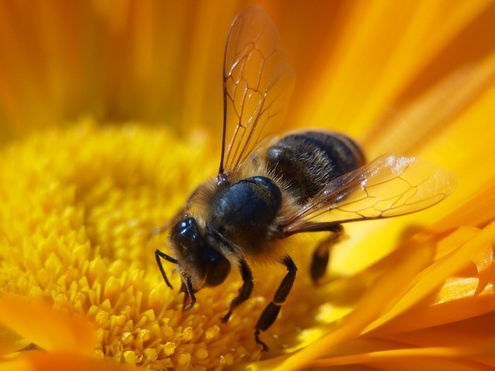Well before we go into why this bee is classified as a "killer" (poor little fellow) we need to look at a few things about the Africanized Bee. The Africanized Killer Bee is actually a result of cross breeding between the European Honey Bee and the African Honey Bee.
It is believed that a Brazilian bee keeper who was trying to interbreed the both European and African honey bees had accidentally let some loose. crossed bred bees resulted in a much more aggressive type bees that eventually made its way across the Americas. The bees are feared because of how they attack. They are well known to for aggressive swarms which will relentlessly chase their victims for miles. If your are cornered by these bad boys you will be aggressively stung hundreds or thousands of time leaving you either in excruciating pain or if medical attention is not received soon enough; death.
Africanised Honey Bee facts
Even though the Africanised Honey Bee is quite aggressive and even dangerous at times, traits that make them less desirable for commercial beekeeping. They have bullied themselves into becoming the dominant type of honeybee due to genetic superiority than all other counterparts. The Africanised killer bees exhibit without a doubt better and more honey production and when it comes on to pollination they come out top notch also. These little buzzers have to time to just sit idling, pollen and honey is their business, and if you accidentally stumble upon a wild nest of bees. Just leave them alone as they could be Africanized.
Deploys in greater numbers for defense and pursues perceived threats over much longer distances from the hive.
- In other words, these killer bees don't run out of stamina that easily and are very persistent in a chase. Their objective when chasing you is to simply inflict pain so you know the next time you are in their proximity you better stay at a good distance.
Is more likely to migrate as part of a seasonal response to lowered food supply.
- Well, these bees will not stick around when food supplies begin to run low. They will travel for hundreds of miles to find a suitable environment where they can continue with their chores of making honey while they have adequate food supply.
Tends to swarm more frequently and go farther than other types of honey bees.
- These bees are just natural swarmers and will do so very quickly. When these Africanised bees come together and form swarms it is like a frenzy which they love. An excited and ready to attack swam that just spells bad for you.
Has greater defensiveness when in a resting swarm, compared to other honey bee types
- These killer bees are not just gonna sit by and let you trample all over their hives. If they have to go down, they will defend their resting swarm aggressively.
Have a higher proportion of Guard Bees in hive
- These little yet aggressive dudes take their protection of their colony quite serious. On any indication that their hive is about to be threatened or is being threatened, they will attack mercilessly.
The way how many people describe the Africanized Honey Bee you would actually believe that it is a Goliath bees from mars with deadly venom that sucks on humans as lollipops. These honey bees are nothing like the picture some would want us to believe in their battles against the bees. The Africanized bee sting has no more venom than any other variety of bees. The reason why the African honey bee is feared is simply because of its aggression and its attack in swarms. The africanized honey bee will deliver at least 50% more sting to a body in an attack than all other bee species. They are relentless in pursuit and will basically chase and sting you many times. They will chase you over a kilometer in distance if they have to. Now that to me is one determined bee.
Queen Bee: Is the only bee in the hive that is sexually developed. She is the largest, and can be recognized by here elongated abdomen. The worker bee select which eggs will become queens. Once a queen is born, she goes on a mating flight and drone bees fertilize her. This fertilization flight can last her entire lifespan. She lives longer than all the bees in the hive. Some say she can live years and years, but she is most productive the first two years or so.


 RSS Feed
RSS Feed
